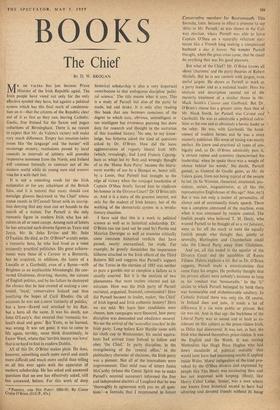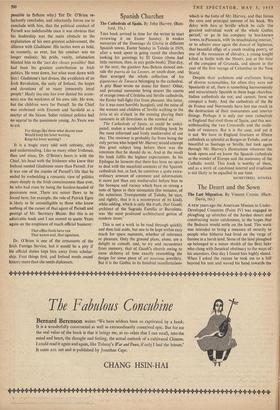BOOKS
The Chief
BY D. W. BROGAN MR. DE VALERA has just become Prime Minister of the Irish Republic again. The Irish people have voted not only for the only effective symbol they have, but against a political system which has this final mark of condemna- tion on it—that the citizens of the. Republic clear out of it as fast as they can, leaving Catholic, Gaelic, free Ireland for the Saxon and pagan seductions of Birmingham. There is no reason to expect that Mr. de Valera's victory will make very much difference. Empty but emotion-laden issues like 'the language' and 'the border' will encourage oratory, resolutions passed by local councils in intervals of jobbery will provoke responsive nonsense from the North, and Ireland will continue formally to contract out of the modern world while its young men and women vote for it with their feet.
It is not a consoling result for the Irish nationalist or for any inhabitant of the British Isles, and it is natural that many should cast nostalgic glances backward to 'the Chief' whose statue stands in O'Connell Street with its inscrip- tion denying that any man can set bounds to the march of a nation. For Parnell is the only romantic figure in modern Irish who has ad- mirers in all or most camps. Among men of letters he has attracted such diverse figures as Yeats and Joyce, Mr. St. John Ervine and Mr. Sean O'Faolain. He died, as Dr. O'Brien* acutely notes, a romantic hero, he who had lived as a most eminently practical politician. His great achieve- ments were those of a Cavour or a Bismarck, but he acquired, in addition, the lustre of a Lassalle or a Garibaldi, even of a Byron—with Brighton as an implausible Missolonghi. He con- verted Gladstone, diverting, thereby, the current of English politics, and by his failure he destroyed the chance that he had created of making a con- tented, 'loyal,' conservative Ireland and thus justifying the hopes of Cecil Rhodes. On all accounts he was not a mere 'curiosity of politics,' but a hero—flawed and wrecked by his flaw, but a hero all the same. It was his death, not John O'Leary's, that ensured that 'romantic Ire- land's dead and gone.' !Rut Yeats, as he learned, was wrong. It was not gone; it was to come to life again, terribly, some think disastrously, in Easter Week, where that 'terrible beauty was born' that is so hard to find in modern Dublin.
All of this Dr. O'Brien makes plain. He does, however, something much more novel and much more difficult and much more useful than telling us all this over again with the apparatus of modern scholarship. He has asked and answered questions that no one has effectively asked, still less answered, before. For this work of deep • PARNELL AND HIS PARTY 1880-90. By Conor Cruise O'Brien. (0.U.P., 45s.) historical scholarship is also a very important contribution to that ambiguous discipline 'politi- cal science.' The title means what it says. This is a study of Parnell but also of the party he made, led and broke. It is only after reading this book that one becomes conscious of the degree to which easy, obvious, unintelligent or too intelligent but erroneous guessing has done duty for research and thought in the narration of this troubled history.' No one, to my know- ledge, has hitherto asked the kind of questions asked by Dr. O'Brien. How did the loose agglomeration of vaguely liberal Irish MPs (which, revealingly, had Lord Francis Conyng- ham as whip) led by Butt and wrongly thought of as the 'Home Rule Party' become the instru- ment worthy of use by a Blanqui or, better still, by a Lenin, that Parnell had brought to the edge of victory when the conjugal touchiness of Captain O'Shea finally forced him to vindicate his honour in the Divorce Court? Dr. O'Brien tells us. And it is a story of the greatest interest, not only for the student of Irish history, but of the working of the democratic system in a revolu- tionary situation.
I have said that this is a work in political science as well as in historical scholarship. Dr. O'Brien can use (and not be used by) Pareto and Maurice Duverger as well as examine critically some common historical verdicts that have passed, nearly unexamined, for truth. For example, he greatly diminishes the importance hitherto attached to the Irish effects of the Third Reform Bill and suggests that Parnell's support of the Tories in the election of 1885 was neither as pure a gamble nor as complete a failure as is usually asserted. But it is the analysis of two phenomena that most excites interest and ad- miration. How was the Irish party of Parnell recruited, organised, financed, commanded? How did Parnell become its leader, maker, 'the Chief' of Irish legend and Irish authentic history? Here we are told. We learn how candidates were chosen, how campaigns were financed, how party discipline was demanded and obedience secured. We see the arrival of the 'nouvelles couches' in the Irish party. Long- before Keir Hardie came with his cloth cap to Westminster, his social equiva- lents had arrived from Ireland to follow and obey 'the Chief.' In party discipline, in the strengthening of the 'central office,' in the plebiscitary character of elections, the Irish party was a pioneer. Not all of the innovations were improvements. That mild man of letters Justin McCarthy (whom the Comic Spirit was to make Parnell's nominal successor) informed the free and independent electors of Longford that he was 'thoroughly in agreement with you on all ques- tions'—a formula that I recommend to future Conservative members for Bournemouth. This formula, later, became in effect a promise to say 'ditto to Mr. Parnell,' as was shown in the Gal- way election, where Parnell was able to force Captain O'Shea on a naturally reluctant elec-• torate like a French king making a complaisant husband a duc a brevet. No wonder Parnell thought, when the great crisis came, that he could do anything that was his good pleasure.
But what of the Chief? Dr. O'Brien knows all about 'charisma' and the party theories of Robert Michels. BUt he is not content with jargon, even useful jargon. He shows us Parnell at work as a party leader and as a national leader. Here his analysis and description remind me of the masterly treatment of a similar theme in Mr. Mack Smith's Cavour and Garfbaldi. But Dr. O'Brien's theme has a greater unity than that of Mr. Mack Smith, for Parnell was Cavour and Garibaldi. He was as admirable a political calcu- lator as the one and as obviously a heroic leader as the other. He was, with Garibaldi, the hand- somest of modern heroes and he was a most masterly politician. His sense of timing was nearly perfect. He knew and practised all types of am- biguity and, as Dr.- O'Brien admirably puts it, 'a certain repose and economy characterised his leadership; when he spoke there was a weight of silence behind his words.' No doubt, Parnell gained, as General de Gaulle gains, as Mr. de Valera gains, from not being typical of the people he led. (Is Sir Winston, rhetorical, emotional, pas- sionate, unfair, magnanimous, at all like the representative Englishman of this age? Alas, no!) But it was not only a matter of personality, of silence and of occasionally timely speech. There was a complete command of the machine, even when it was command by remote control. The ' foolish people who believed T. M. Healy, who wanted Parnell to be thought of as a roi faineant, were as far off the mark as were the equally foolish people who thought that, jointly or severally, Hartington and Chamberlain could take the Liberal Party away from Gladstone.
And yet, all this ended in the squalor of the Divorce Court and the squabbles of Room Fifteen. Hubris explains a lot. But as Dr. O'Brien suggests, Parnell made a miscalculation that came from his origins. He probably thought that his private affairs were nobody's business as long as his conduct was 'honourable.' In the 'U' circles to which Parnell belonged by birth there was honourable and dishonourable adultery. In Catholic Ireland there was only sin. Of course, in Ireland- then and now, it made a lot of difference if a sin were public or private. But sin was sin. And in that age, the backbone of the Liberal Party was as sound and at least as in- tolerant on this subject as the priest-ridden Irish, as Dilke had discovered. It was not, in fact, the Irish who showed themselves priest-Hdden. It was the English and the Welsh. It was ranting Methodists like Hugh Price Hughes who laid down standards of political morality that would later have had interesting results if applied inside Wales. Moral indignation of the. kind pro- voked by the O'Shea divorce and expressed by people like Tim Healy was nauseating then and has not improved with keeping. (Healy, like Henry Cabot Lodge, Senior, was a man whom one knows from historical record to have had admiring and devoted friends without its being possible to fathom why.) Yet Dr. O'Brien re- luctantly concludes, and reluctantly forces me to conclude with him, that the political conduct of Parnell was indefensible once it was obvious that his leadership was the main obstacle to the exploitation of his own greatest achievement, the
alliance with Gladstone. His tactics were as bold, as masterly, as ever, but his conduct was no longer realistic; his pride, vanity, infatuation
blinded him to the 'tact des choses possibles' that had been his greatest contribution to Irish politics. He went down, but what went down with
him! Gladstone's last dream, the avoidance of an Trish Revolution, the unity of Ireland, the hopes and devotions of so many innocently loyal people! Healy (no one has ever denied his acute- ness) saw the weakness of his own side. He won, but the children were for Parnell. So the Chief was enshrined with Emmett and Sarsfield as a martyr of the Saxon. Sober rational politics had no appeal to the passionate young. As Yeats was to ask For things like these what decent man Would keep his lover waiting, Keep his lover waiting?
It is a tragic story told with sobriety, style and understanding. Like so many other Irishmen, then and since, Dr. O'Brien's heart is with the Chief, his head with the Irishmen who knew that Ireland needed Gladstone more than Parnell. For
it was one of the ironies of Parnell's life that he ended by embedding a romantic view of politics more deeply in the Irish consciousness than ever,
he who had risen by being the hardest-headed of passionate men.. There are minor flaws to be found here; for example, the role of Patrick Egan is likely to be unintelligible to those who know nothing of the career of that agent of Parnell and protegd of Mr. Secretary Blaine. But this is an admirable book and I am moved to quote Yeats again on the emptiness of much official business : That office fools have run That waxen seal, that signature.
Dr. O'Brien is one of the ornaments of the Irish Foreign Service, but it would be a pity if his official duties kept him away from scholar- ship. First things first, and Ireland needs sound history more thah she needs diplomats.











































 Previous page
Previous page